SUDAN travel log (1): day 12 t/m 21
Written by JAN EISENLOEFFEL.
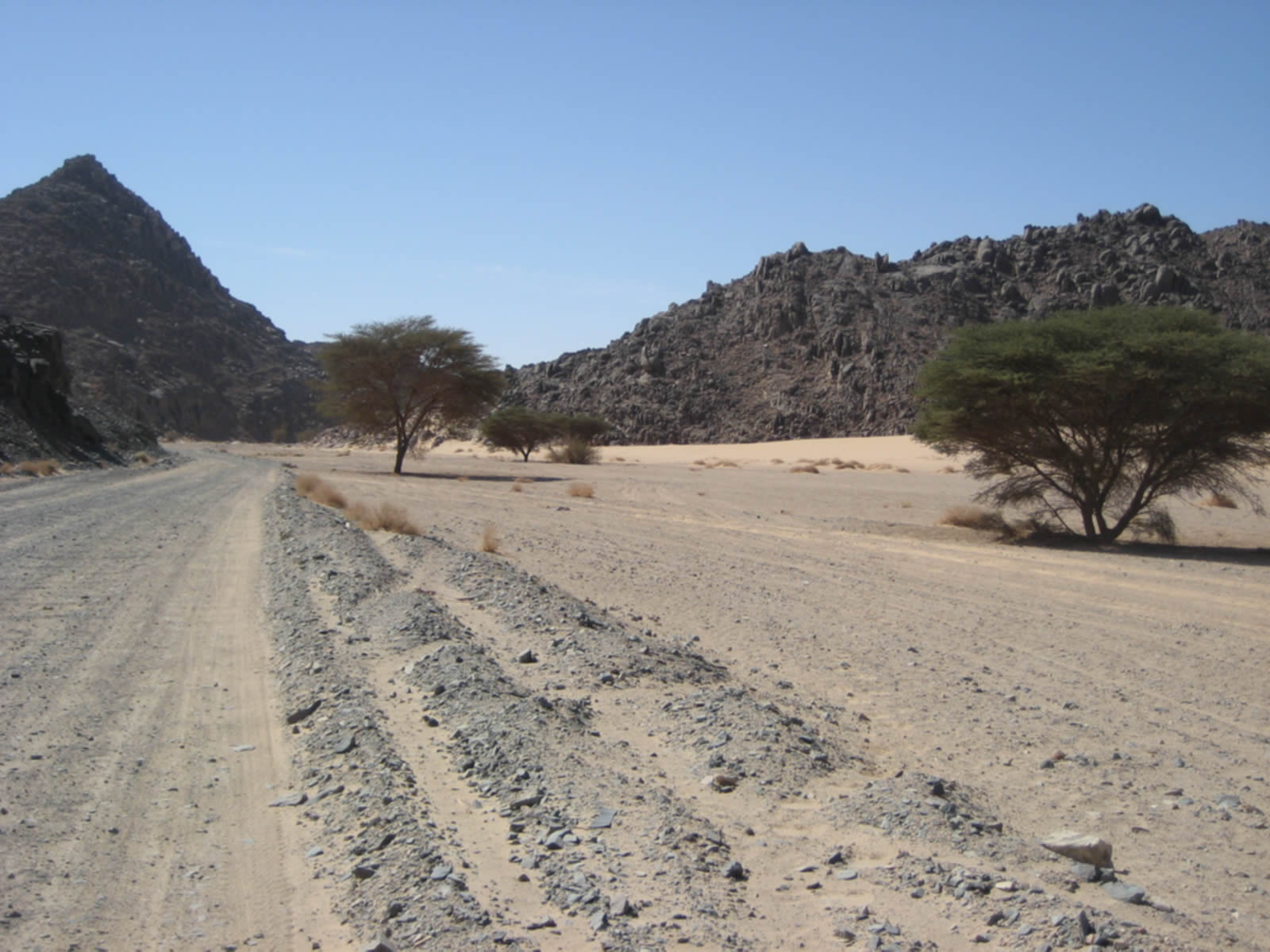
January 24, day 1 in Sudan, 60 km over unpaved rubbish, stones, sand, holes, you name it and it was there. A couple of short demanding ascents. With a little luck I finished third because three of the faster ones took another 2 km longer route. Beautiful weather 17-32 degrees Celsius, in the sun warmer. Air nice and fresh. But, everything covered in sand and dust because we're in the middle of the desert. On to the next desert camp. Today, 88 km over the most horrible roads imaginable: sand, rocks, stones and gravel. We bike about parallel to the Nile which we could see for a short while. Strange that water with greenery all around it. Beautiful weather: 17-38 Celsius. Very warm at the end of the trip around 14:00 hrs. Relaxing afternoon, put up the tent and eat lots of soup and bread. Tomorrow another difficult day of about 100 km, but the road seems to get better. Camp will be on the Nile in between the palm trees.
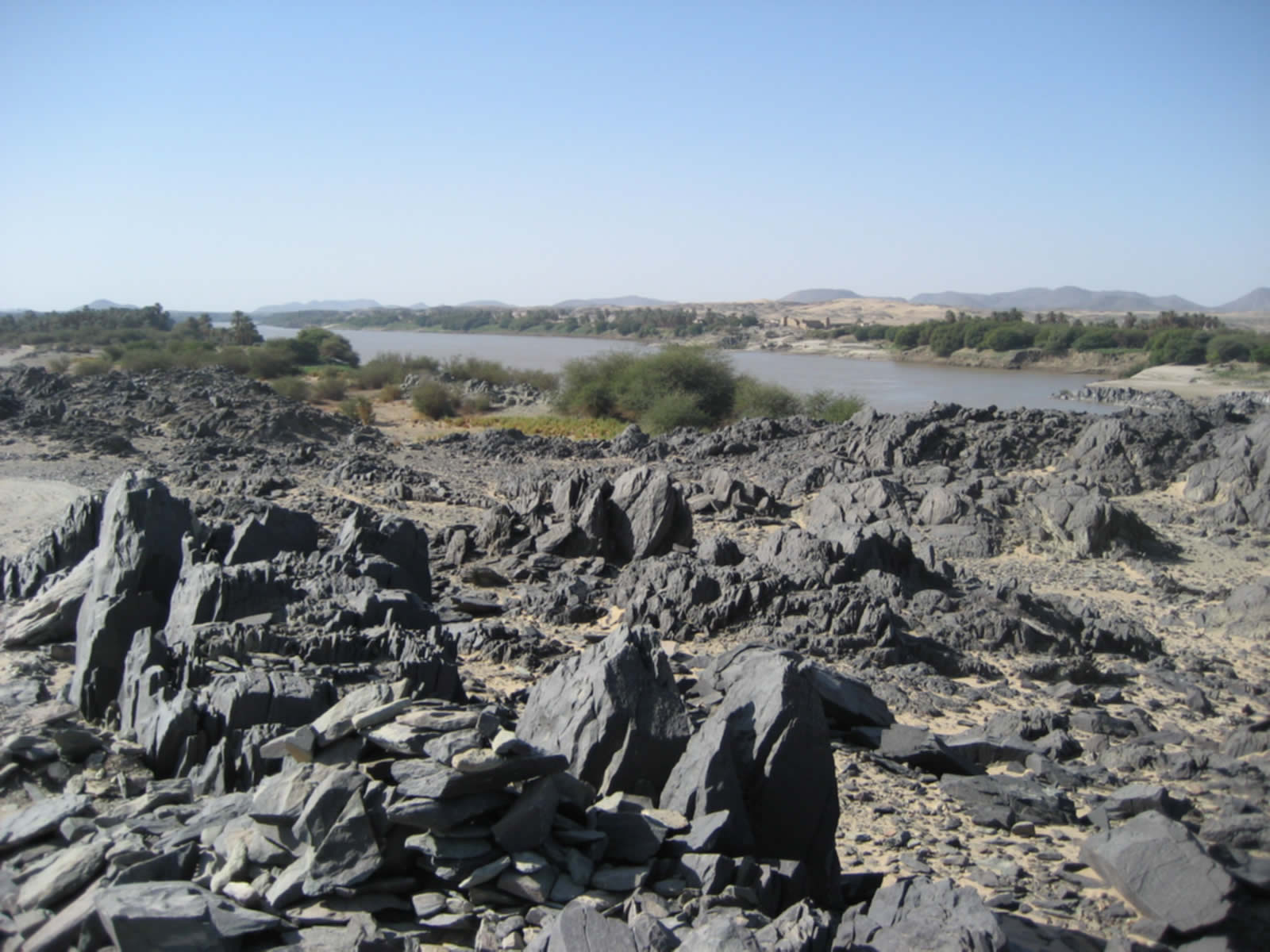
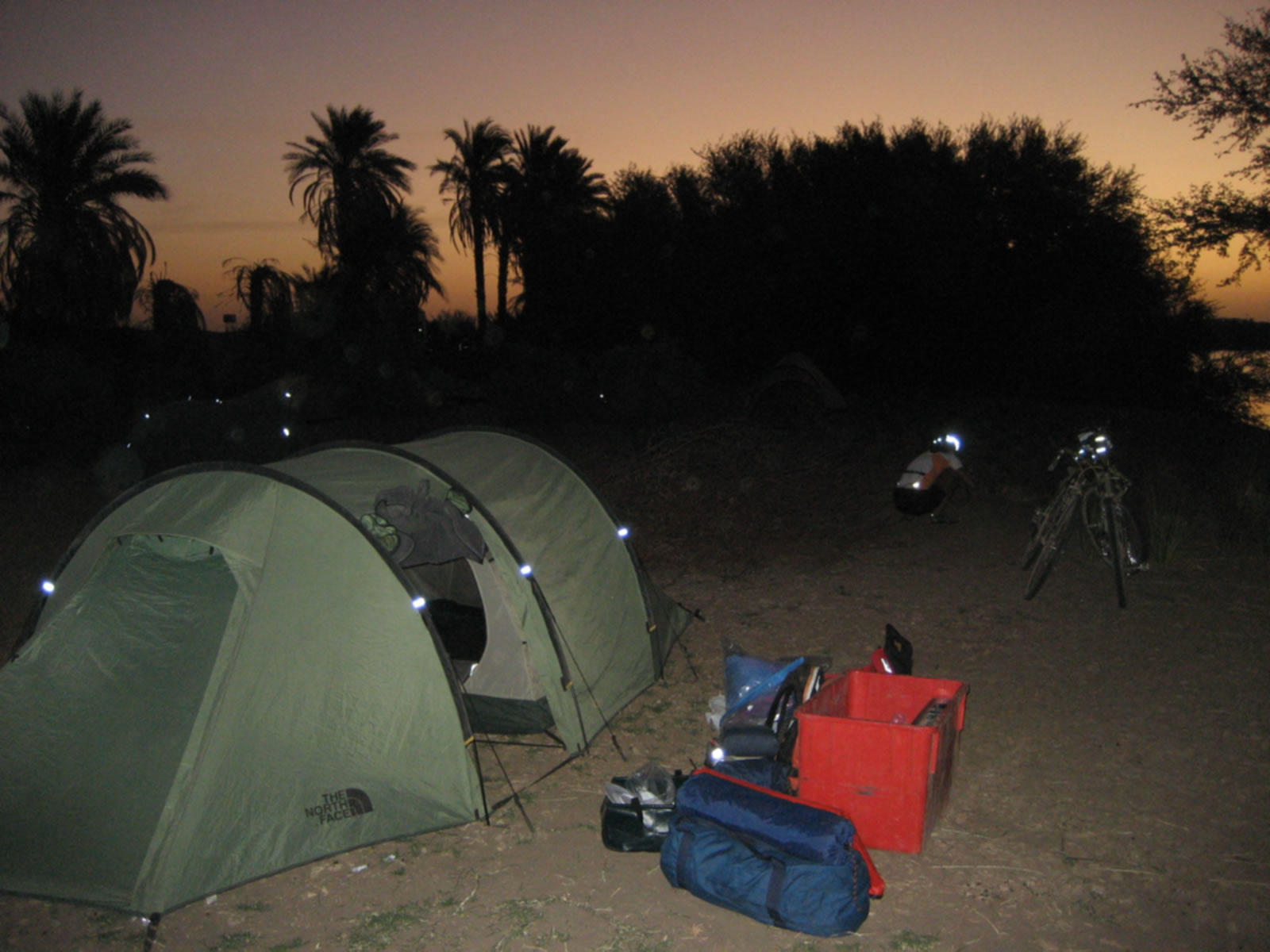
Our next camp will be on the Nile and for a short while we will leave the desert behind us. This is a stretch of 98 km which took me 5h2m and at 2:30 p.m. I arrived at the camp. We started at 8:00 a.m. when it was a pleasant 13 degrees Celsius, but during the day the temperature rose to 38 degrees Celsius at arrival. 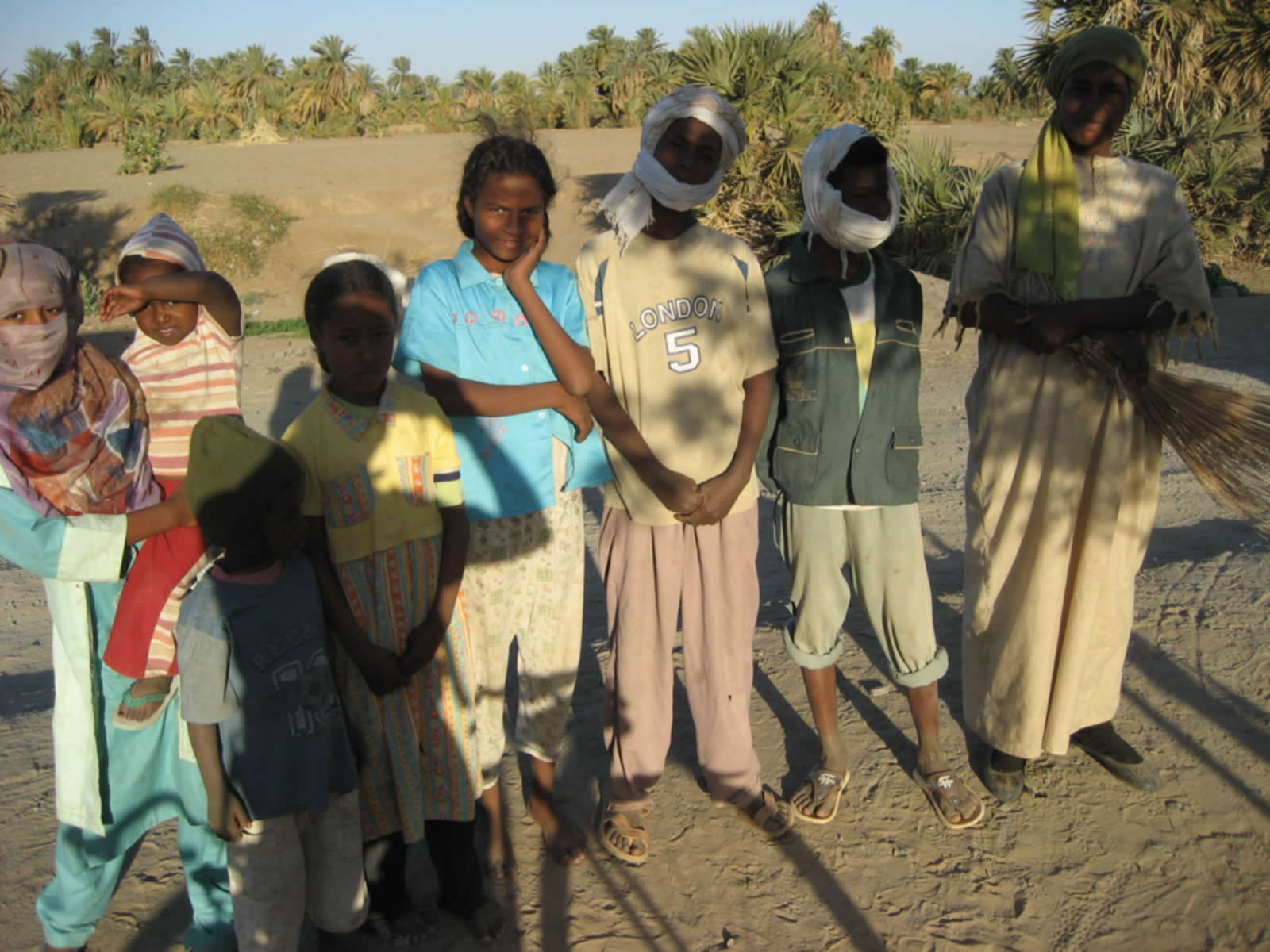 Today the road was much better than yesterday, yet my bottom gave me a lot of trouble. After lunch it was counting down the kilometres: 45, 40, 35, 30, etc., five left and there was the finish flag! The road took us along the Nile and through villages. The one storey homes are well kept, painted white with blue doors and shutters and tidy surroundings. A big difference in comparison to Egypt. People turned out to greet us and invited us to come and talk to them. We couldn't do this too often because we loose too much time. I did stop a few times though. The acquaintance was quite a ceremony: first you shake everybody's hand, then you exchange names, where you come from and where you are going to. Sometimes they invite you in for tea, other times they offer you some nuts. A very friendly and courteous people. Today it is Friday and in the afternoon many people walk around in beautiful garments, the women and girls very colourful, the men in white. At the camp I went for a swim in the Nile, washed my clothes and took care of various sore spots. Oil, cream, anything to heal the dry and chapped skin of my fingers.
Today the road was much better than yesterday, yet my bottom gave me a lot of trouble. After lunch it was counting down the kilometres: 45, 40, 35, 30, etc., five left and there was the finish flag! The road took us along the Nile and through villages. The one storey homes are well kept, painted white with blue doors and shutters and tidy surroundings. A big difference in comparison to Egypt. People turned out to greet us and invited us to come and talk to them. We couldn't do this too often because we loose too much time. I did stop a few times though. The acquaintance was quite a ceremony: first you shake everybody's hand, then you exchange names, where you come from and where you are going to. Sometimes they invite you in for tea, other times they offer you some nuts. A very friendly and courteous people. Today it is Friday and in the afternoon many people walk around in beautiful garments, the women and girls very colourful, the men in white. At the camp I went for a swim in the Nile, washed my clothes and took care of various sore spots. Oil, cream, anything to heal the dry and chapped skin of my fingers.
 Today the road was much better than yesterday, yet my bottom gave me a lot of trouble. After lunch it was counting down the kilometres: 45, 40, 35, 30, etc., five left and there was the finish flag! The road took us along the Nile and through villages. The one storey homes are well kept, painted white with blue doors and shutters and tidy surroundings. A big difference in comparison to Egypt. People turned out to greet us and invited us to come and talk to them. We couldn't do this too often because we loose too much time. I did stop a few times though. The acquaintance was quite a ceremony: first you shake everybody's hand, then you exchange names, where you come from and where you are going to. Sometimes they invite you in for tea, other times they offer you some nuts. A very friendly and courteous people. Today it is Friday and in the afternoon many people walk around in beautiful garments, the women and girls very colourful, the men in white. At the camp I went for a swim in the Nile, washed my clothes and took care of various sore spots. Oil, cream, anything to heal the dry and chapped skin of my fingers.
Today the road was much better than yesterday, yet my bottom gave me a lot of trouble. After lunch it was counting down the kilometres: 45, 40, 35, 30, etc., five left and there was the finish flag! The road took us along the Nile and through villages. The one storey homes are well kept, painted white with blue doors and shutters and tidy surroundings. A big difference in comparison to Egypt. People turned out to greet us and invited us to come and talk to them. We couldn't do this too often because we loose too much time. I did stop a few times though. The acquaintance was quite a ceremony: first you shake everybody's hand, then you exchange names, where you come from and where you are going to. Sometimes they invite you in for tea, other times they offer you some nuts. A very friendly and courteous people. Today it is Friday and in the afternoon many people walk around in beautiful garments, the women and girls very colourful, the men in white. At the camp I went for a swim in the Nile, washed my clothes and took care of various sore spots. Oil, cream, anything to heal the dry and chapped skin of my fingers.Another radiant day. I spent a lot of time taking pictures and talking to people (a few words in English go a long way). I visited a school and later in the day passed some time with a few men, sitting in the shade of a tree. The road is reasonable today, but you do get stuck in many places due to the extremely fine sand. I am covered from top to toe with yellow dust and try to clean myself as good as possible with a few drops of water. Our journey through the Nubian Desert finishes at Dunqulah. Tonight, yet another desert camp about three kilometres away from the Nile which we see in the distance. Tomorrow a relaxed day biking. We will cross this part of the desert to Dunqulah as a group. In previous tours participants got lost because many roads run parallel to each other and suddenly finish in a heap of sand.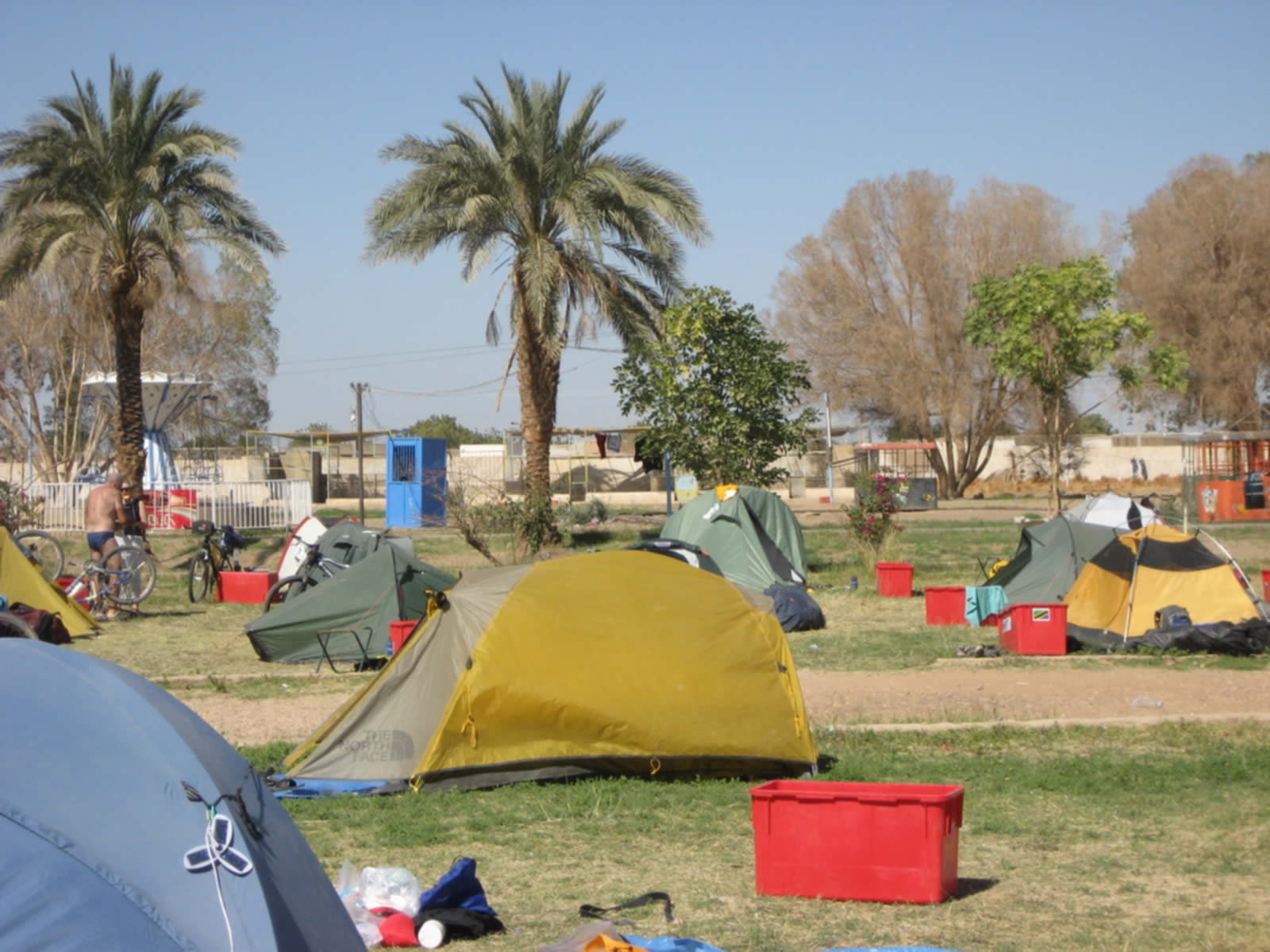

Day off in Dunqulah. Camp is set up in a deserted zoo and the only original inhabitant is a very old, one metre long tortoise. A hose, hung up on a pole, continuously splashes warm water so we can have a shower! Get rid of all the dust, do the laundry, eat and drink, be lazy, take care of the painful spots and look for an Internet Café. My own "office" is a bit crammed. A delicious dinner of Foul (a dish made with beans), Shoarma (meat from the grill and pita bread) and a coke (no beer in this Islamic country) brings this day to an end.
Today, January 30, we ride over a road under construction from Dunqulah to the Al-Qylayd Bahri district on the Westside of the Nile. Asphalt, forty kilometres long, what a great feeling. Then, back to the usual sand and stones, but somehow we can keep a good pace. To the left the Nile and for the rest a flat desert.
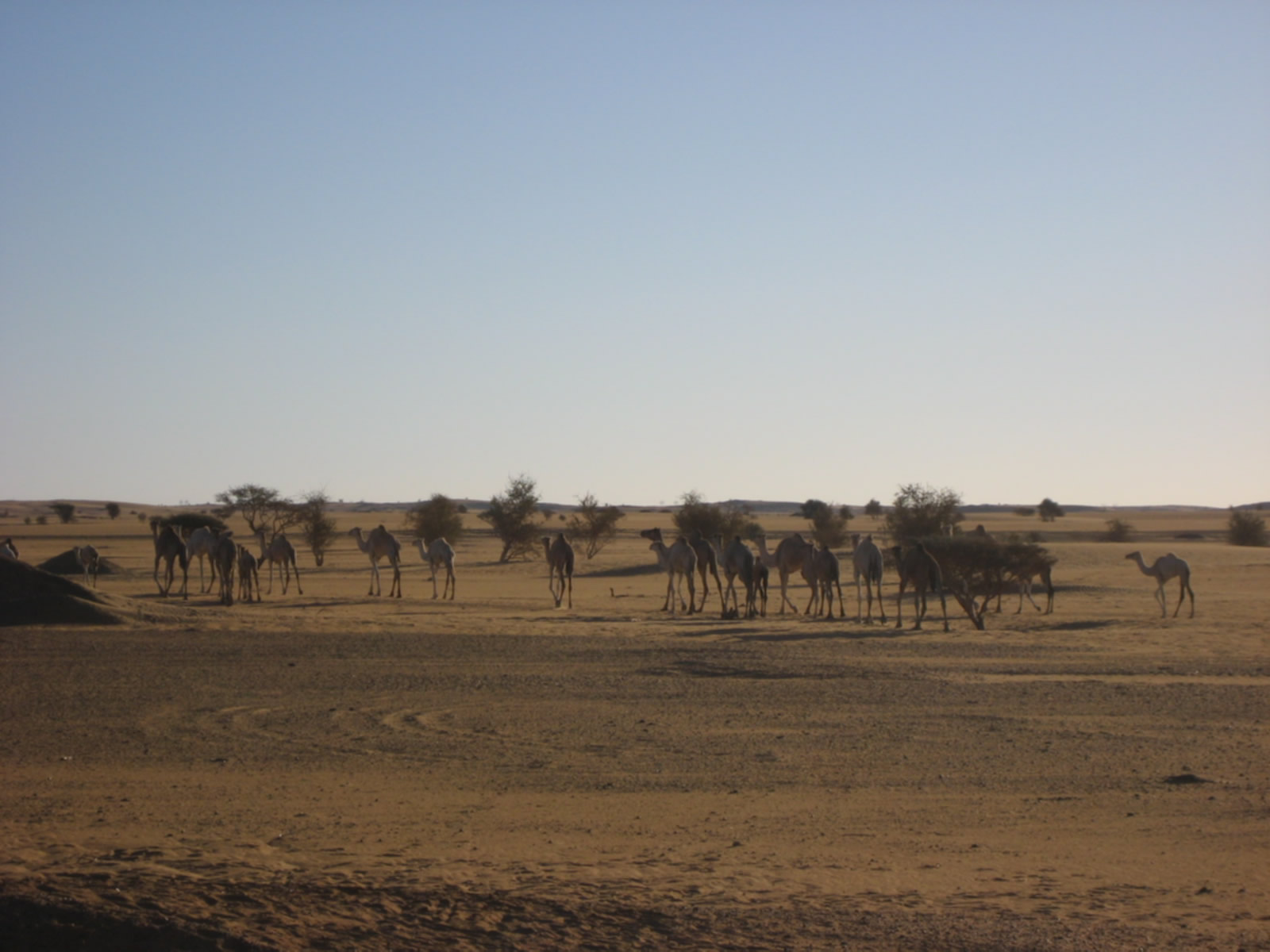
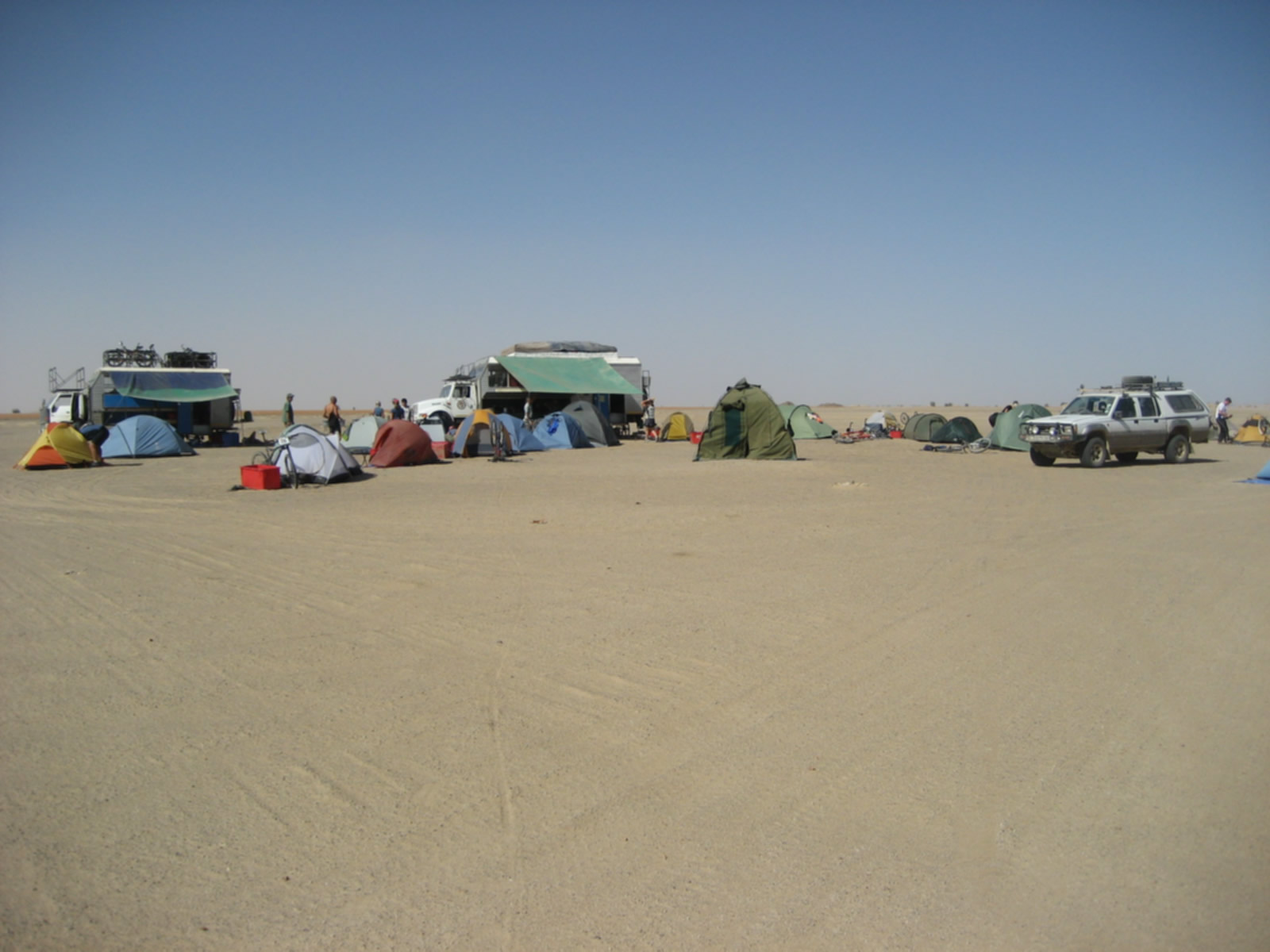 A monotonous landscape, the more reason to bike fast to get a good result in the race. Lunch break at 67 km, ate a sandwich quickly, refueled with water and rode 41 km alone to the finish in the middle of the desert. Fifth place. We also camp here for the night, not very pleasant with this blowing wind. Even dinner is crunchy this evening!
A monotonous landscape, the more reason to bike fast to get a good result in the race. Lunch break at 67 km, ate a sandwich quickly, refueled with water and rode 41 km alone to the finish in the middle of the desert. Fifth place. We also camp here for the night, not very pleasant with this blowing wind. Even dinner is crunchy this evening!

 A monotonous landscape, the more reason to bike fast to get a good result in the race. Lunch break at 67 km, ate a sandwich quickly, refueled with water and rode 41 km alone to the finish in the middle of the desert. Fifth place. We also camp here for the night, not very pleasant with this blowing wind. Even dinner is crunchy this evening!
A monotonous landscape, the more reason to bike fast to get a good result in the race. Lunch break at 67 km, ate a sandwich quickly, refueled with water and rode 41 km alone to the finish in the middle of the desert. Fifth place. We also camp here for the night, not very pleasant with this blowing wind. Even dinner is crunchy this evening!Four more days to Khartoum. The first part over a road under construction then asphalt all the way to the city. I hope so because my bottom hasn't yet recovered from the first five days in Sudan.
SUDAN travel log (2) : Khartoum, day 22/23
GESCHREVEN DOOR JAN EISENLOEFFEL.
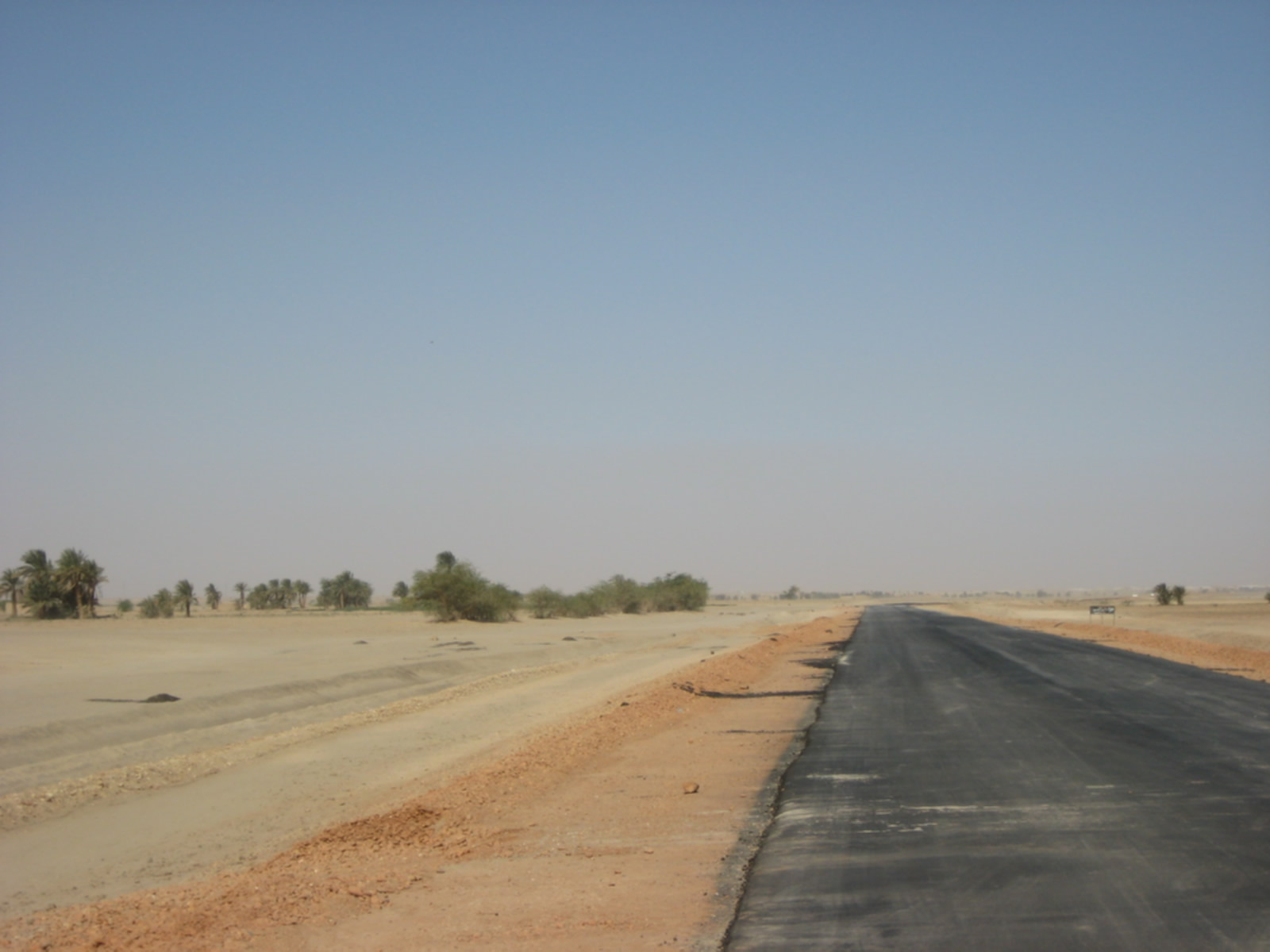
 The trip to Khartoum was quite boring. We cycled over a brand-new, asphalted, road. All around us the yellow sand plains, here and there a few small trees, some camels, goats, donkeys and everywhere people. I haven't yet introduced Betsy and Doris to you. We are accompanied by two trucks and a pick-up truck: Betsy for the luggage, Doris for the lunch. Betsy likes to liven things up, as soon as she arrives at the campsite the music goes on full blast.
The trip to Khartoum was quite boring. We cycled over a brand-new, asphalted, road. All around us the yellow sand plains, here and there a few small trees, some camels, goats, donkeys and everywhere people. I haven't yet introduced Betsy and Doris to you. We are accompanied by two trucks and a pick-up truck: Betsy for the luggage, Doris for the lunch. Betsy likes to liven things up, as soon as she arrives at the campsite the music goes on full blast.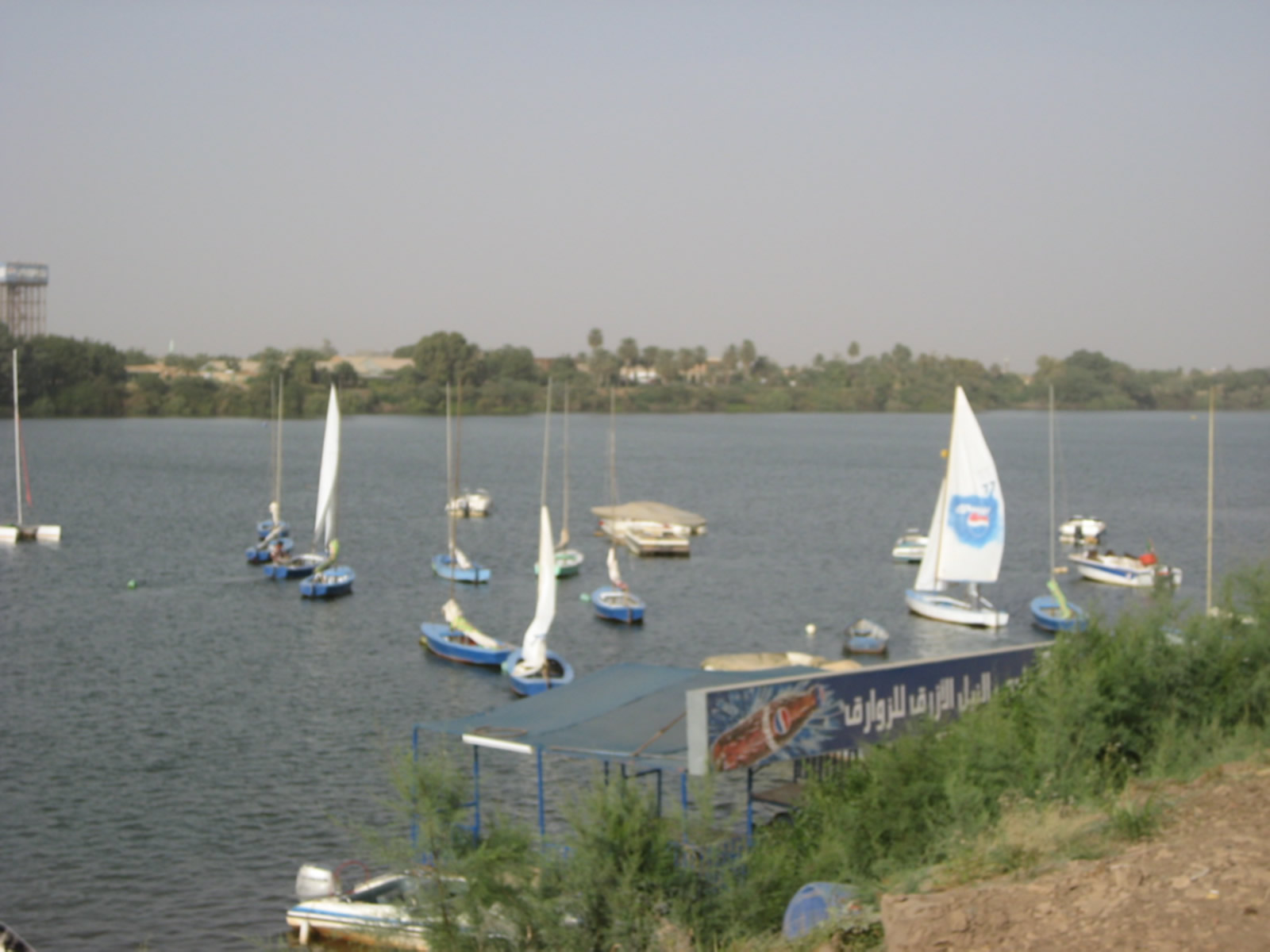 The police are waiting for us in Khartoum to escort us through the city to the Blue Nile Sailing Club where we will stay for a couple of nights. A dozen members of the Khartoum Cycling Club joined us on the way to the sailing club. Enthousiastic guys on very old bikes like Raleighs and Jan Janssen. It is very difficult for them to get good parts so they depend on a chance meeting like e.g. our group.
The police are waiting for us in Khartoum to escort us through the city to the Blue Nile Sailing Club where we will stay for a couple of nights. A dozen members of the Khartoum Cycling Club joined us on the way to the sailing club. Enthousiastic guys on very old bikes like Raleighs and Jan Janssen. It is very difficult for them to get good parts so they depend on a chance meeting like e.g. our group.Khartoum (means Elephant Trunk) is the capital of Sudan and of Khartoum State. The city was founded in 1821 by Muhammad Ali, the ruler of Egypt, as an outpost for the Egyptian army. In 1899 Khartoum became capital of Anglo-Egyptian Sudan and, with the independen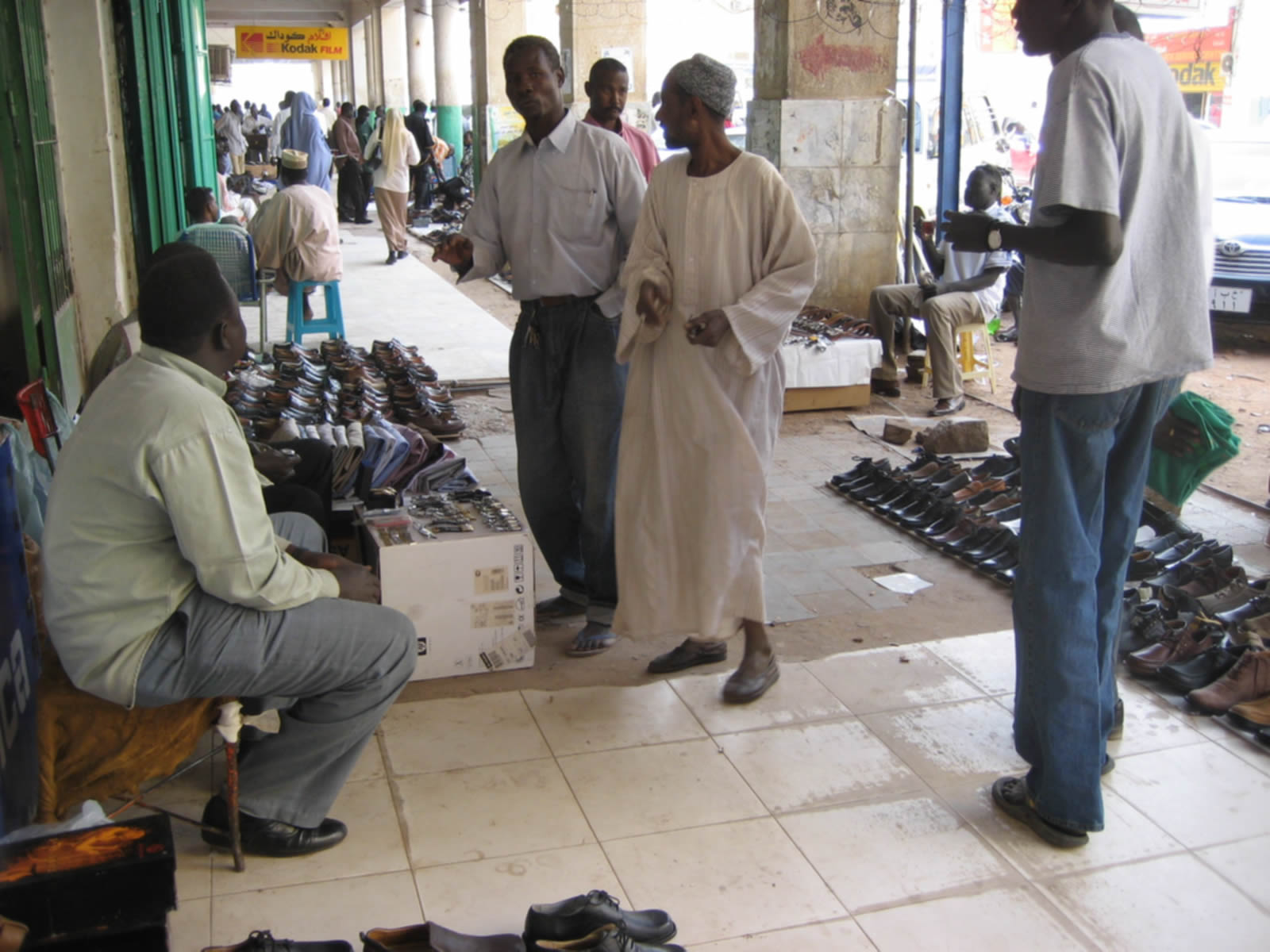 ce of Sudan in 1956, the capital of the new country. The city is located at the point where the White Nile, flowing north from Uganda, meets the Blue Nile, flowing west from Ethiopia.
ce of Sudan in 1956, the capital of the new country. The city is located at the point where the White Nile, flowing north from Uganda, meets the Blue Nile, flowing west from Ethiopia.
 ce of Sudan in 1956, the capital of the new country. The city is located at the point where the White Nile, flowing north from Uganda, meets the Blue Nile, flowing west from Ethiopia.
ce of Sudan in 1956, the capital of the new country. The city is located at the point where the White Nile, flowing north from Uganda, meets the Blue Nile, flowing west from Ethiopia. Khartoum proper has a population of well over a million inhabitants, but forms with its neighbours, Khartoum North and Omdurman, a metropolis with a population totaling over four million. It is clear that the economy in Khartoum is doing reasonably well since a ceasefire between contending groups two years ago. A lot of building activity in the centre of the city and a new bridge , under construction, over the Blue Nile. The road we cycled on, the last few days, is brand-new 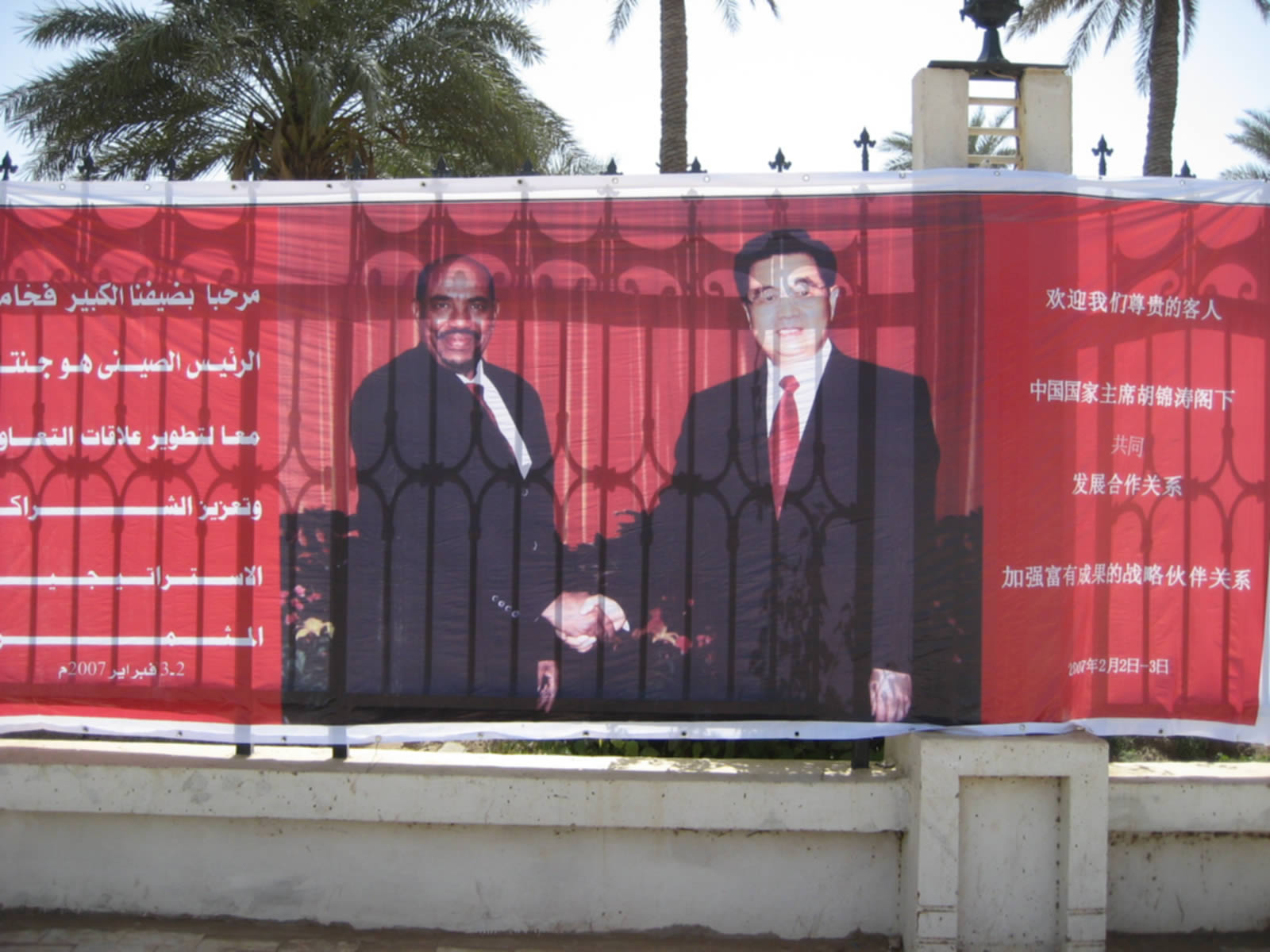 and constructed by Chinese road workers.
and constructed by Chinese road workers. 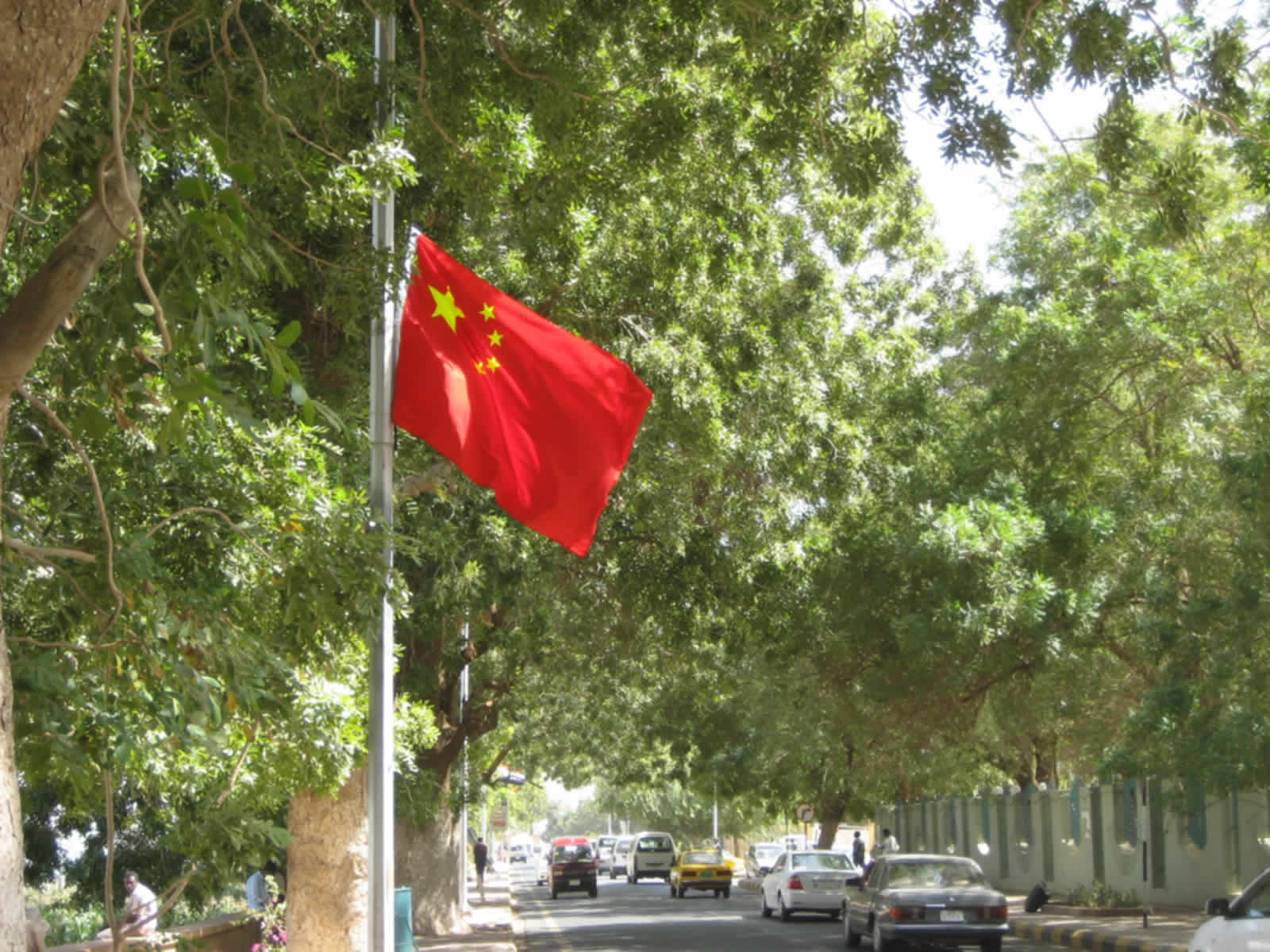 The close ties with China become quite clear when we cycle over the Sharia Al Nil, the boulevard along the Nile, and pass the presidential palace: a one kilometre stretch of Chinese and Sudanese flags side by side and huge portraits of both presidents. Among the city's industries are printing, glass manufacturing, food processing and textiles. Petroleum products are now produced in the far north of Khartoum state, providing fuel and jobs for the city. Khartoum is the main location for most of Sudan's top educational bodies. The Academy of Medical Sciences and Technology was founded in 1996 by Prof. Mamoun Humaida in the heart of the city. It is considered to be one of the best educational establishments in the country and viewed by most to be the pioneer Private University in Sudan.
The close ties with China become quite clear when we cycle over the Sharia Al Nil, the boulevard along the Nile, and pass the presidential palace: a one kilometre stretch of Chinese and Sudanese flags side by side and huge portraits of both presidents. Among the city's industries are printing, glass manufacturing, food processing and textiles. Petroleum products are now produced in the far north of Khartoum state, providing fuel and jobs for the city. Khartoum is the main location for most of Sudan's top educational bodies. The Academy of Medical Sciences and Technology was founded in 1996 by Prof. Mamoun Humaida in the heart of the city. It is considered to be one of the best educational establishments in the country and viewed by most to be the pioneer Private University in Sudan.
 and constructed by Chinese road workers.
and constructed by Chinese road workers.  The close ties with China become quite clear when we cycle over the Sharia Al Nil, the boulevard along the Nile, and pass the presidential palace: a one kilometre stretch of Chinese and Sudanese flags side by side and huge portraits of both presidents. Among the city's industries are printing, glass manufacturing, food processing and textiles. Petroleum products are now produced in the far north of Khartoum state, providing fuel and jobs for the city. Khartoum is the main location for most of Sudan's top educational bodies. The Academy of Medical Sciences and Technology was founded in 1996 by Prof. Mamoun Humaida in the heart of the city. It is considered to be one of the best educational establishments in the country and viewed by most to be the pioneer Private University in Sudan.
The close ties with China become quite clear when we cycle over the Sharia Al Nil, the boulevard along the Nile, and pass the presidential palace: a one kilometre stretch of Chinese and Sudanese flags side by side and huge portraits of both presidents. Among the city's industries are printing, glass manufacturing, food processing and textiles. Petroleum products are now produced in the far north of Khartoum state, providing fuel and jobs for the city. Khartoum is the main location for most of Sudan's top educational bodies. The Academy of Medical Sciences and Technology was founded in 1996 by Prof. Mamoun Humaida in the heart of the city. It is considered to be one of the best educational establishments in the country and viewed by most to be the pioneer Private University in Sudan.SUDAN travel log (3) : day 12 t/m 27
GESCHREVEN DOOR JAN EISENLOEFFEL.
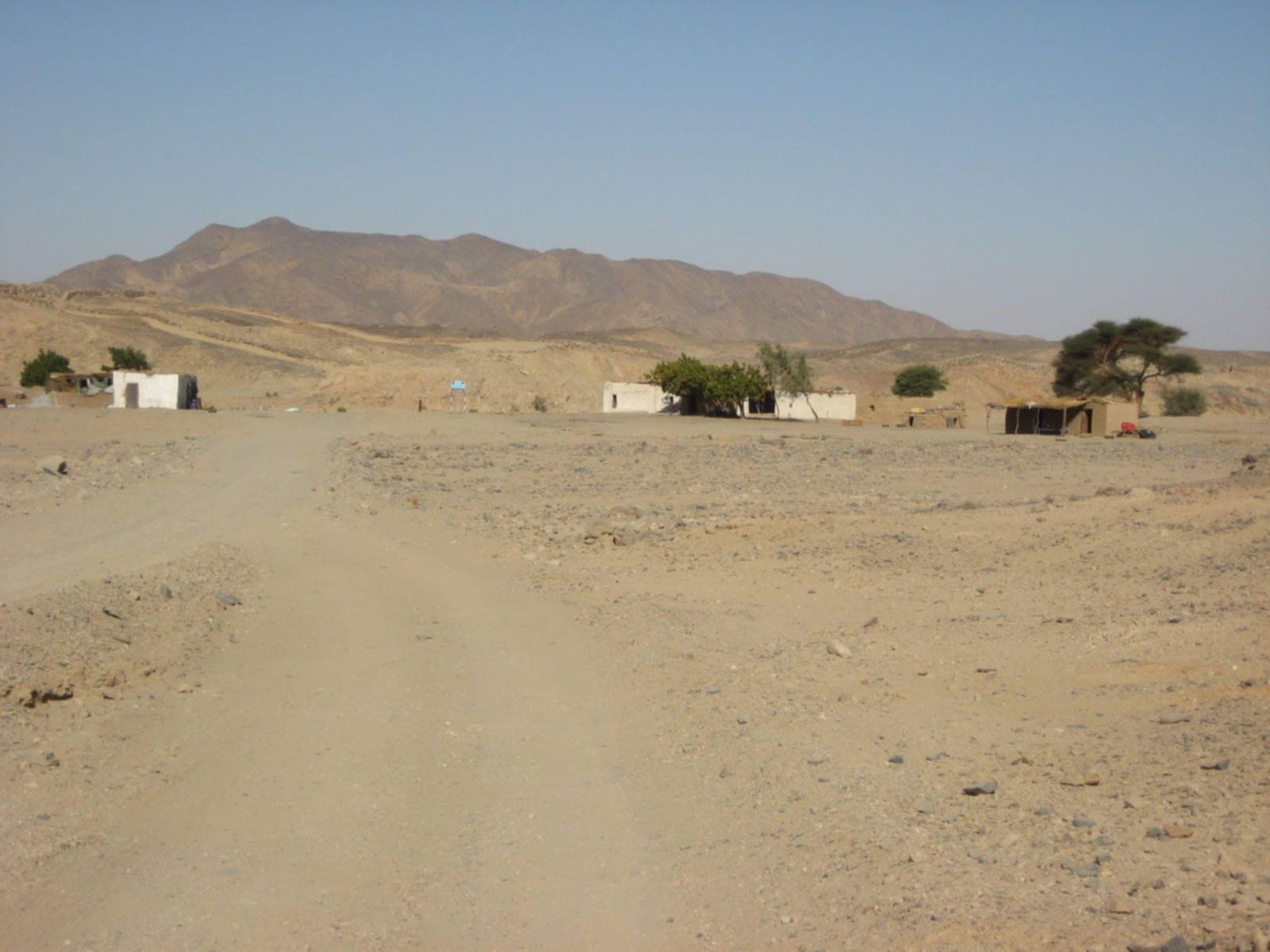 Sudan is the largest country of Africa and the Arabic world covering an area of ca. 2.4 million sq km. Of this, five per cent is suitable for development. The Nubian Desert, where Jan is biking at the moment, covers 407.000 sq km (ca. 157.000 sq mi). This arid region, largely a sandstone plateau has numerous wadis flowing toward, but never reaching, the Nile. Contrary to popular believe the desert is only 30% sand, the rest rocks, stones and gravel plains.
Sudan is the largest country of Africa and the Arabic world covering an area of ca. 2.4 million sq km. Of this, five per cent is suitable for development. The Nubian Desert, where Jan is biking at the moment, covers 407.000 sq km (ca. 157.000 sq mi). This arid region, largely a sandstone plateau has numerous wadis flowing toward, but never reaching, the Nile. Contrary to popular believe the desert is only 30% sand, the rest rocks, stones and gravel plains.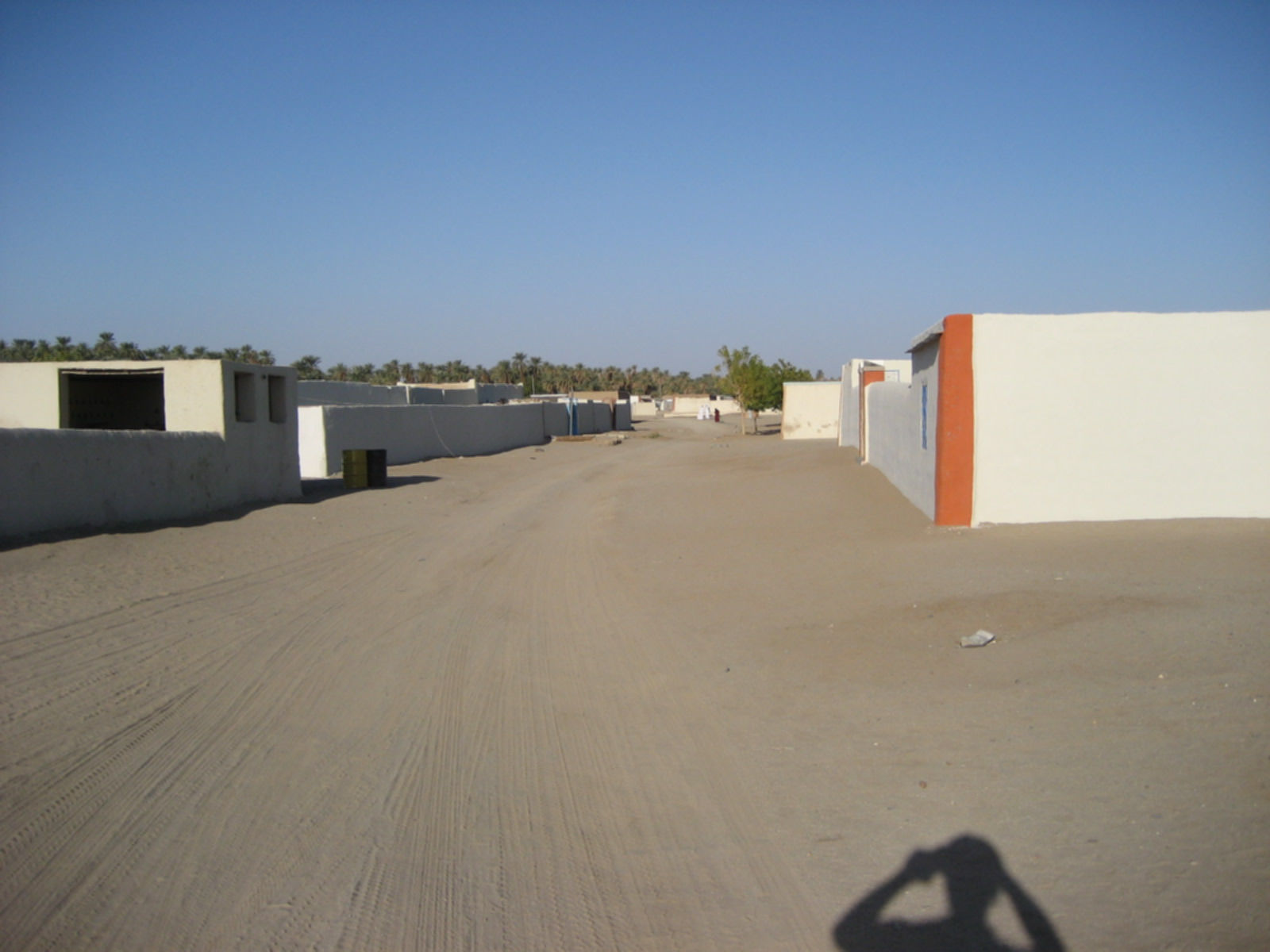
Travelling through Sudan has been a very pleasant experience, particularly because of the people. I positively believe that the people of Sudan are one of the most friendly and hospitable people in the world. They make a proud and calm impression. Their children listen to thier parents well when called back as they enthusiastically run onto the road to greet us. The one storey houses, of stone and clay, are neatly painted white, the grounds well kept and the gate, in the wall around the property, is often decorated with beautiful designs. Closer to Khartoum and definitely in southern Sudan the environment is not as tidy, about 200 km from the Ethiopian border we see the first round grass huts. In northern Sudan a small structure is built every few kilometres a long the road. Inside are large clay vessels with cool water to be used as refreshment by the tired, hot and dusty traveller. What a great feeling to splash water over your head, neck and arms during a temperature of 42 degrees Celsius. 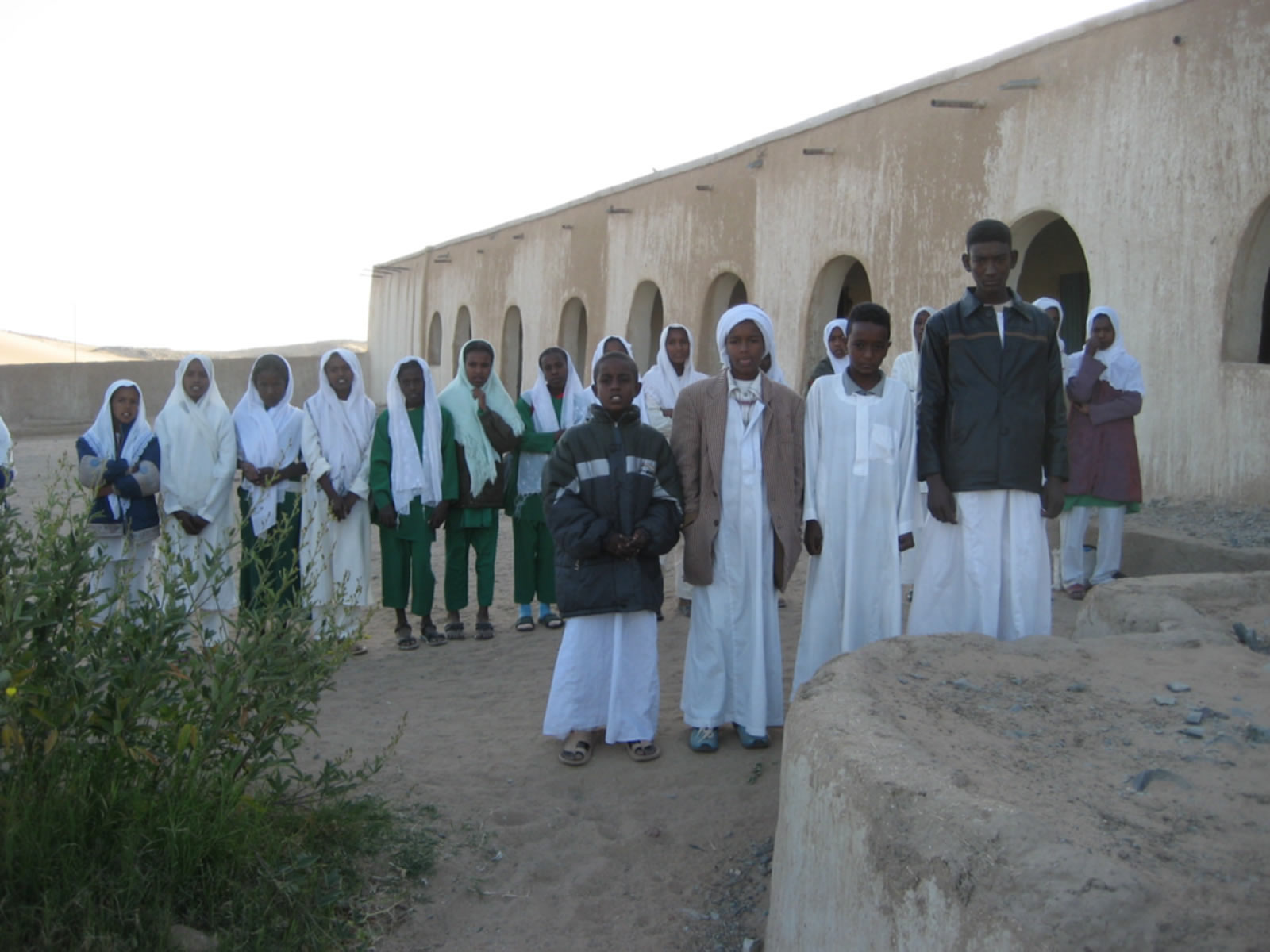
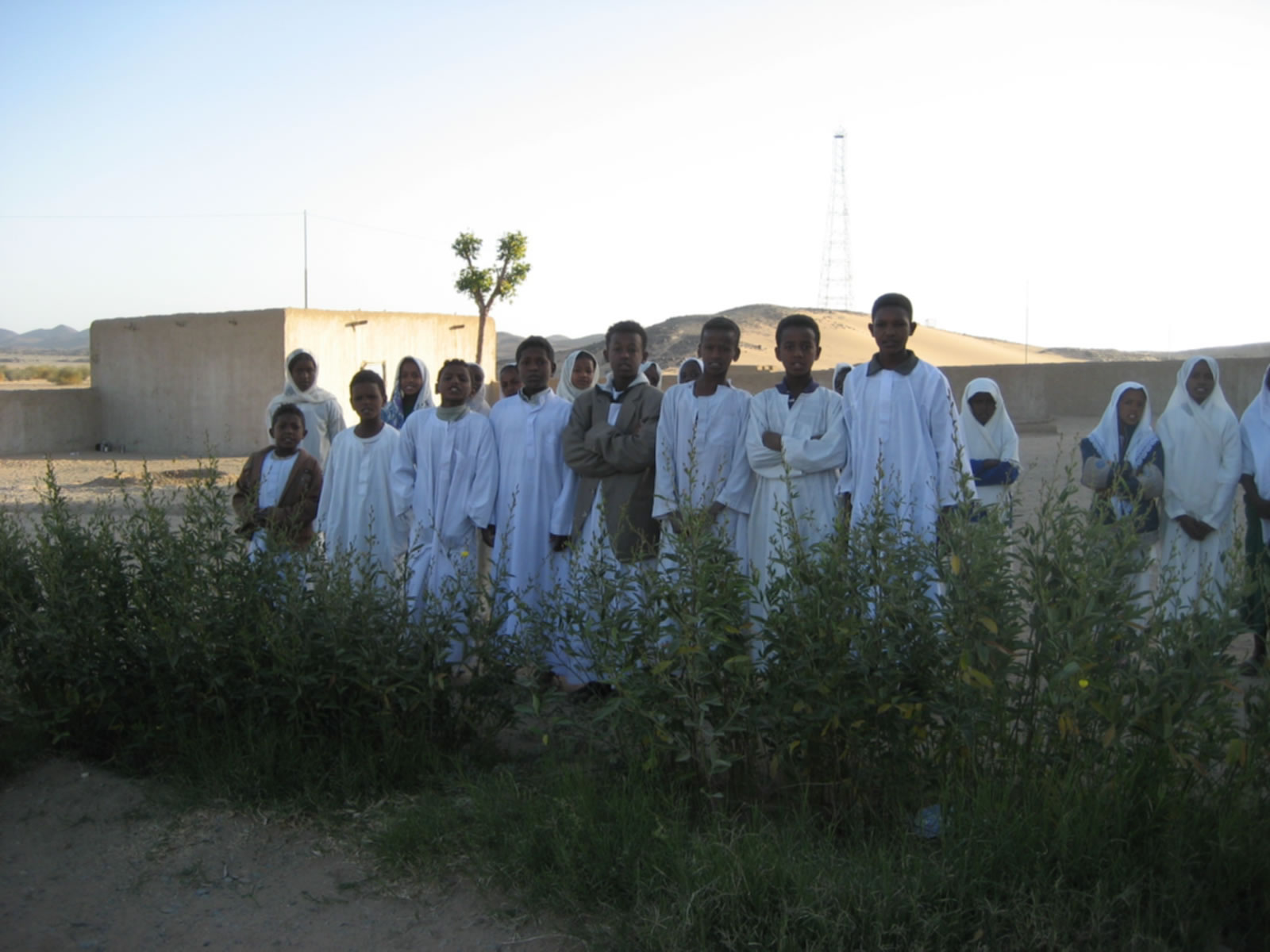 Yet, in northern Nubia I had to stop when I saw a large group of children with a woman, who frantically waved a big envelop, to call the rushing racers a halt to. After the usual greeting "what's your name, where are you from, where are you going" it turns out to be the local English teacher who is on her way to school. I am invited to come along and visit the school quite a bit further down the road. On the way we talk about different things, but there is one thing that sticks on my mind. She had mentioned the Danish cartoons and how offending those were to the Muslim world. For that I apologize and try to explain that in the West you can say and depict a lot even if it is insulting to others. Here the conversation stops about this topic. Is it because of poor English or doesn't she want to enter into a discussion. I suspect the latter. When we arrive at the school the children neatly assemble in a square in the middle of the schoolyard, sing the national anthem and a Koran verse. I film a bit and take pictures. Suddenly it is quiet and it becomes clear that it is my turn now to do something. In slow and simple English I thank them for their singing, told them to do their very best in school and sang "Piet Hein, his name is...." to which they give their full attention. Never in my life did I have so much success singing a song as today! Then to the classroom with the teacher. A small room with a few tables and chairs, a smooth piece of wall, painted black, which serves as a blackboard.The girls are sitting on the left, seperated from the boys on the right. A few children are asked to come forward and tell, in English, their name, how old they are and answer a couple of questions asked by the teacher. It must be terrifying for them to do this in front of a total stranger from the West! Next they sing an unintelligible English song about their morning ritual: getting up, washing themselves, brushing teeth, etc., luckily because of all the gestures I can follow the story. After one more verse from the Koran I say goodbye and continue my bike ride, a beautiful experience richer.
Yet, in northern Nubia I had to stop when I saw a large group of children with a woman, who frantically waved a big envelop, to call the rushing racers a halt to. After the usual greeting "what's your name, where are you from, where are you going" it turns out to be the local English teacher who is on her way to school. I am invited to come along and visit the school quite a bit further down the road. On the way we talk about different things, but there is one thing that sticks on my mind. She had mentioned the Danish cartoons and how offending those were to the Muslim world. For that I apologize and try to explain that in the West you can say and depict a lot even if it is insulting to others. Here the conversation stops about this topic. Is it because of poor English or doesn't she want to enter into a discussion. I suspect the latter. When we arrive at the school the children neatly assemble in a square in the middle of the schoolyard, sing the national anthem and a Koran verse. I film a bit and take pictures. Suddenly it is quiet and it becomes clear that it is my turn now to do something. In slow and simple English I thank them for their singing, told them to do their very best in school and sang "Piet Hein, his name is...." to which they give their full attention. Never in my life did I have so much success singing a song as today! Then to the classroom with the teacher. A small room with a few tables and chairs, a smooth piece of wall, painted black, which serves as a blackboard.The girls are sitting on the left, seperated from the boys on the right. A few children are asked to come forward and tell, in English, their name, how old they are and answer a couple of questions asked by the teacher. It must be terrifying for them to do this in front of a total stranger from the West! Next they sing an unintelligible English song about their morning ritual: getting up, washing themselves, brushing teeth, etc., luckily because of all the gestures I can follow the story. After one more verse from the Koran I say goodbye and continue my bike ride, a beautiful experience richer.
The day before we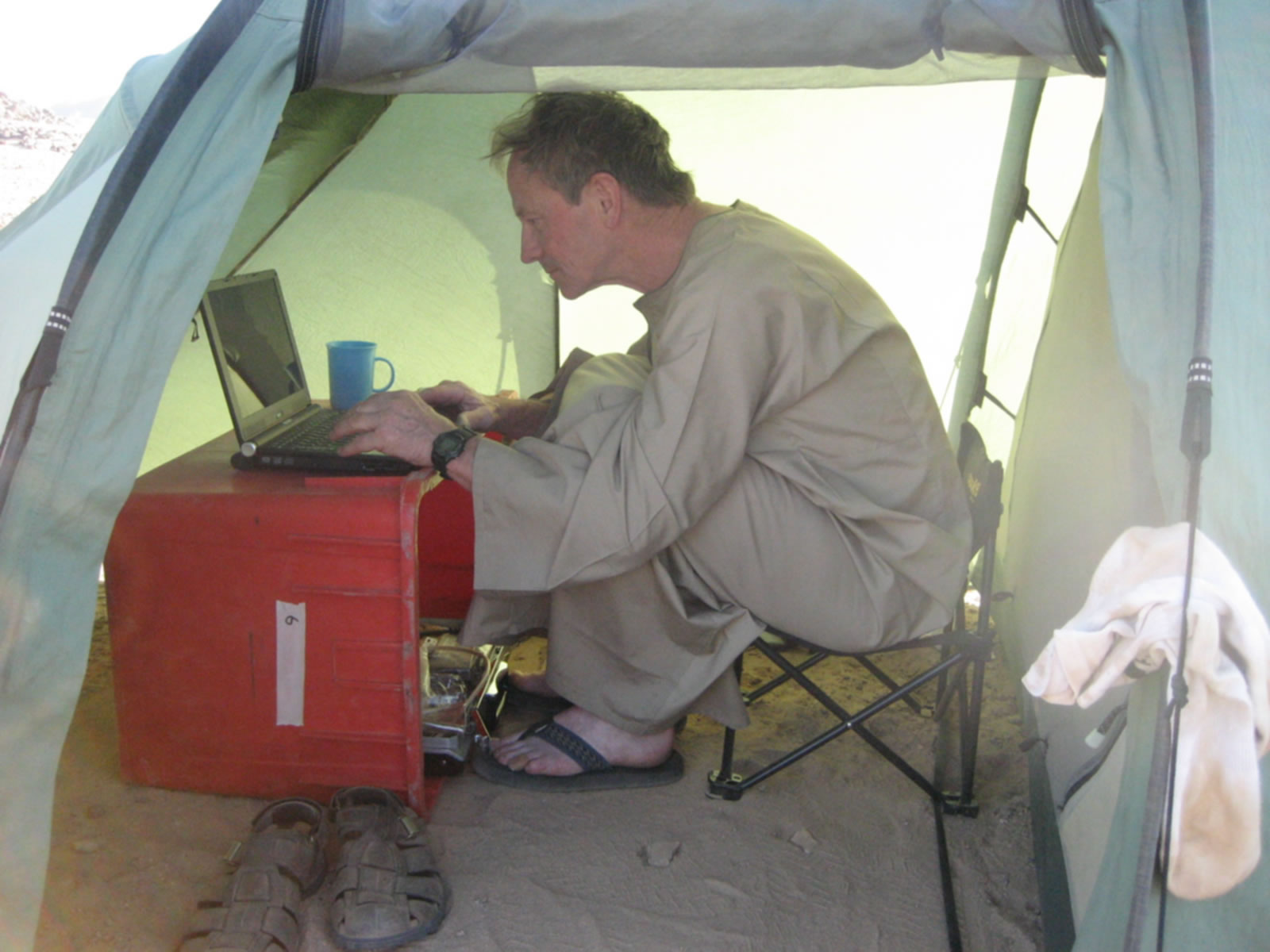 arrive in Dunqulah I stop, to escape the heat, next to a tree with a canopy built around it. It turns out to be the meeting place for the village elderly, who are sitting on mats on the ground all dressed in white Sudanese galabia. After the greeting ritual I get a place on the mat and a cup of tea. Another tour rider has been sitting there for more then a hour and even shared a warm meal with them. Two of the men speak reasonable good English. One worked for an American company in the Gulf, the other a retired local teacher. About 1200 people live in the village, there is a school, a small hospital, electricity, water, etc. The teacher used to teach history, geography and English. I asked him if he was allowed to teach Nubian history. A lively discussion - in Arabic - broke loose and after a bit of pressure he said he wasn't allowed. From a government's viewpoint understandable, but it is a pity of such an old and rich history. The men are not too pleased with the government in Khartoum: "they are all Arabs", but they do speak well of the healthcare in their region.
arrive in Dunqulah I stop, to escape the heat, next to a tree with a canopy built around it. It turns out to be the meeting place for the village elderly, who are sitting on mats on the ground all dressed in white Sudanese galabia. After the greeting ritual I get a place on the mat and a cup of tea. Another tour rider has been sitting there for more then a hour and even shared a warm meal with them. Two of the men speak reasonable good English. One worked for an American company in the Gulf, the other a retired local teacher. About 1200 people live in the village, there is a school, a small hospital, electricity, water, etc. The teacher used to teach history, geography and English. I asked him if he was allowed to teach Nubian history. A lively discussion - in Arabic - broke loose and after a bit of pressure he said he wasn't allowed. From a government's viewpoint understandable, but it is a pity of such an old and rich history. The men are not too pleased with the government in Khartoum: "they are all Arabs", but they do speak well of the healthcare in their region.

 Yet, in northern Nubia I had to stop when I saw a large group of children with a woman, who frantically waved a big envelop, to call the rushing racers a halt to. After the usual greeting "what's your name, where are you from, where are you going" it turns out to be the local English teacher who is on her way to school. I am invited to come along and visit the school quite a bit further down the road. On the way we talk about different things, but there is one thing that sticks on my mind. She had mentioned the Danish cartoons and how offending those were to the Muslim world. For that I apologize and try to explain that in the West you can say and depict a lot even if it is insulting to others. Here the conversation stops about this topic. Is it because of poor English or doesn't she want to enter into a discussion. I suspect the latter. When we arrive at the school the children neatly assemble in a square in the middle of the schoolyard, sing the national anthem and a Koran verse. I film a bit and take pictures. Suddenly it is quiet and it becomes clear that it is my turn now to do something. In slow and simple English I thank them for their singing, told them to do their very best in school and sang "Piet Hein, his name is...." to which they give their full attention. Never in my life did I have so much success singing a song as today! Then to the classroom with the teacher. A small room with a few tables and chairs, a smooth piece of wall, painted black, which serves as a blackboard.The girls are sitting on the left, seperated from the boys on the right. A few children are asked to come forward and tell, in English, their name, how old they are and answer a couple of questions asked by the teacher. It must be terrifying for them to do this in front of a total stranger from the West! Next they sing an unintelligible English song about their morning ritual: getting up, washing themselves, brushing teeth, etc., luckily because of all the gestures I can follow the story. After one more verse from the Koran I say goodbye and continue my bike ride, a beautiful experience richer.
Yet, in northern Nubia I had to stop when I saw a large group of children with a woman, who frantically waved a big envelop, to call the rushing racers a halt to. After the usual greeting "what's your name, where are you from, where are you going" it turns out to be the local English teacher who is on her way to school. I am invited to come along and visit the school quite a bit further down the road. On the way we talk about different things, but there is one thing that sticks on my mind. She had mentioned the Danish cartoons and how offending those were to the Muslim world. For that I apologize and try to explain that in the West you can say and depict a lot even if it is insulting to others. Here the conversation stops about this topic. Is it because of poor English or doesn't she want to enter into a discussion. I suspect the latter. When we arrive at the school the children neatly assemble in a square in the middle of the schoolyard, sing the national anthem and a Koran verse. I film a bit and take pictures. Suddenly it is quiet and it becomes clear that it is my turn now to do something. In slow and simple English I thank them for their singing, told them to do their very best in school and sang "Piet Hein, his name is...." to which they give their full attention. Never in my life did I have so much success singing a song as today! Then to the classroom with the teacher. A small room with a few tables and chairs, a smooth piece of wall, painted black, which serves as a blackboard.The girls are sitting on the left, seperated from the boys on the right. A few children are asked to come forward and tell, in English, their name, how old they are and answer a couple of questions asked by the teacher. It must be terrifying for them to do this in front of a total stranger from the West! Next they sing an unintelligible English song about their morning ritual: getting up, washing themselves, brushing teeth, etc., luckily because of all the gestures I can follow the story. After one more verse from the Koran I say goodbye and continue my bike ride, a beautiful experience richer. The day before we
 arrive in Dunqulah I stop, to escape the heat, next to a tree with a canopy built around it. It turns out to be the meeting place for the village elderly, who are sitting on mats on the ground all dressed in white Sudanese galabia. After the greeting ritual I get a place on the mat and a cup of tea. Another tour rider has been sitting there for more then a hour and even shared a warm meal with them. Two of the men speak reasonable good English. One worked for an American company in the Gulf, the other a retired local teacher. About 1200 people live in the village, there is a school, a small hospital, electricity, water, etc. The teacher used to teach history, geography and English. I asked him if he was allowed to teach Nubian history. A lively discussion - in Arabic - broke loose and after a bit of pressure he said he wasn't allowed. From a government's viewpoint understandable, but it is a pity of such an old and rich history. The men are not too pleased with the government in Khartoum: "they are all Arabs", but they do speak well of the healthcare in their region.
arrive in Dunqulah I stop, to escape the heat, next to a tree with a canopy built around it. It turns out to be the meeting place for the village elderly, who are sitting on mats on the ground all dressed in white Sudanese galabia. After the greeting ritual I get a place on the mat and a cup of tea. Another tour rider has been sitting there for more then a hour and even shared a warm meal with them. Two of the men speak reasonable good English. One worked for an American company in the Gulf, the other a retired local teacher. About 1200 people live in the village, there is a school, a small hospital, electricity, water, etc. The teacher used to teach history, geography and English. I asked him if he was allowed to teach Nubian history. A lively discussion - in Arabic - broke loose and after a bit of pressure he said he wasn't allowed. From a government's viewpoint understandable, but it is a pity of such an old and rich history. The men are not too pleased with the government in Khartoum: "they are all Arabs", but they do speak well of the healthcare in their region. The desert close to Khartoum is flat and the air is clean. In the city our camp is at the Blue Nile Sailing Club, and we have to get used to air pollution again. We receive a warm welcome from the Sudanese Cycling Federation and various government officials. We leave Kh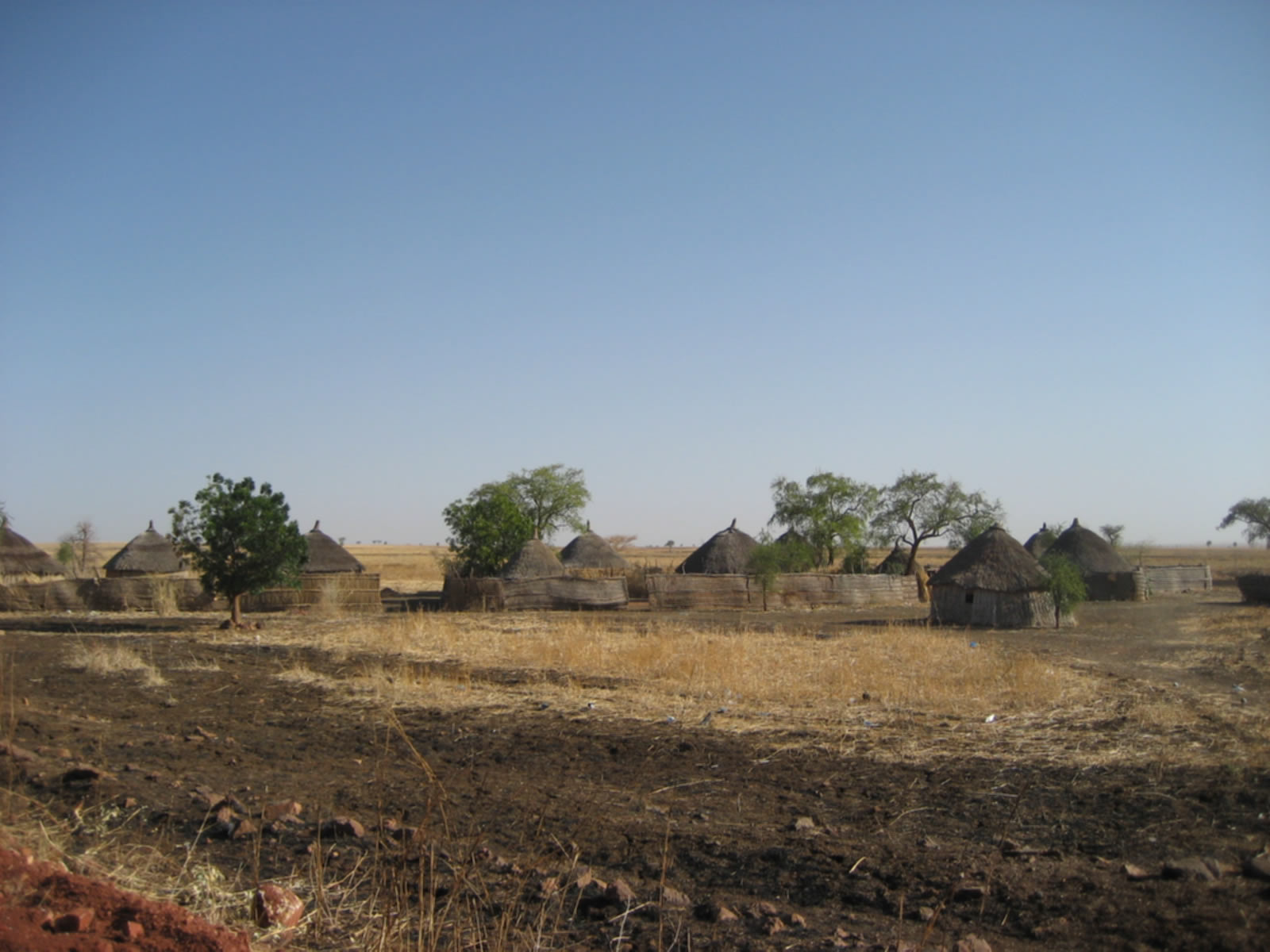 artoum under police escort and travel nearly three days over a very busy and dirty road, through dusty, brown air. Only after the town of Hasa Heisa, where we cross the Blue Nile, the air becomes cleaner. This is clearly a more populated region of Sudan with industry and agriculture, but shabbier looking then north of Khartoum.
artoum under police escort and travel nearly three days over a very busy and dirty road, through dusty, brown air. Only after the town of Hasa Heisa, where we cross the Blue Nile, the air becomes cleaner. This is clearly a more populated region of Sudan with industry and agriculture, but shabbier looking then north of Khartoum.
 artoum under police escort and travel nearly three days over a very busy and dirty road, through dusty, brown air. Only after the town of Hasa Heisa, where we cross the Blue Nile, the air becomes cleaner. This is clearly a more populated region of Sudan with industry and agriculture, but shabbier looking then north of Khartoum.
artoum under police escort and travel nearly three days over a very busy and dirty road, through dusty, brown air. Only after the town of Hasa Heisa, where we cross the Blue Nile, the air becomes cleaner. This is clearly a more populated region of Sudan with industry and agriculture, but shabbier looking then north of Khartoum. I talked to a participant, a contemporary of mine, living in Quebec, Canada but originally from Alexandria, Egypt about the town Hasa Heisa. Finally a name I can remember. I explain what the word "heisa" means in Dutch and to my surprise he said it means the same in Arabic, (heisa = to-do, fuss). Again, a mystery of the Dutch language solved!
Sudan, the l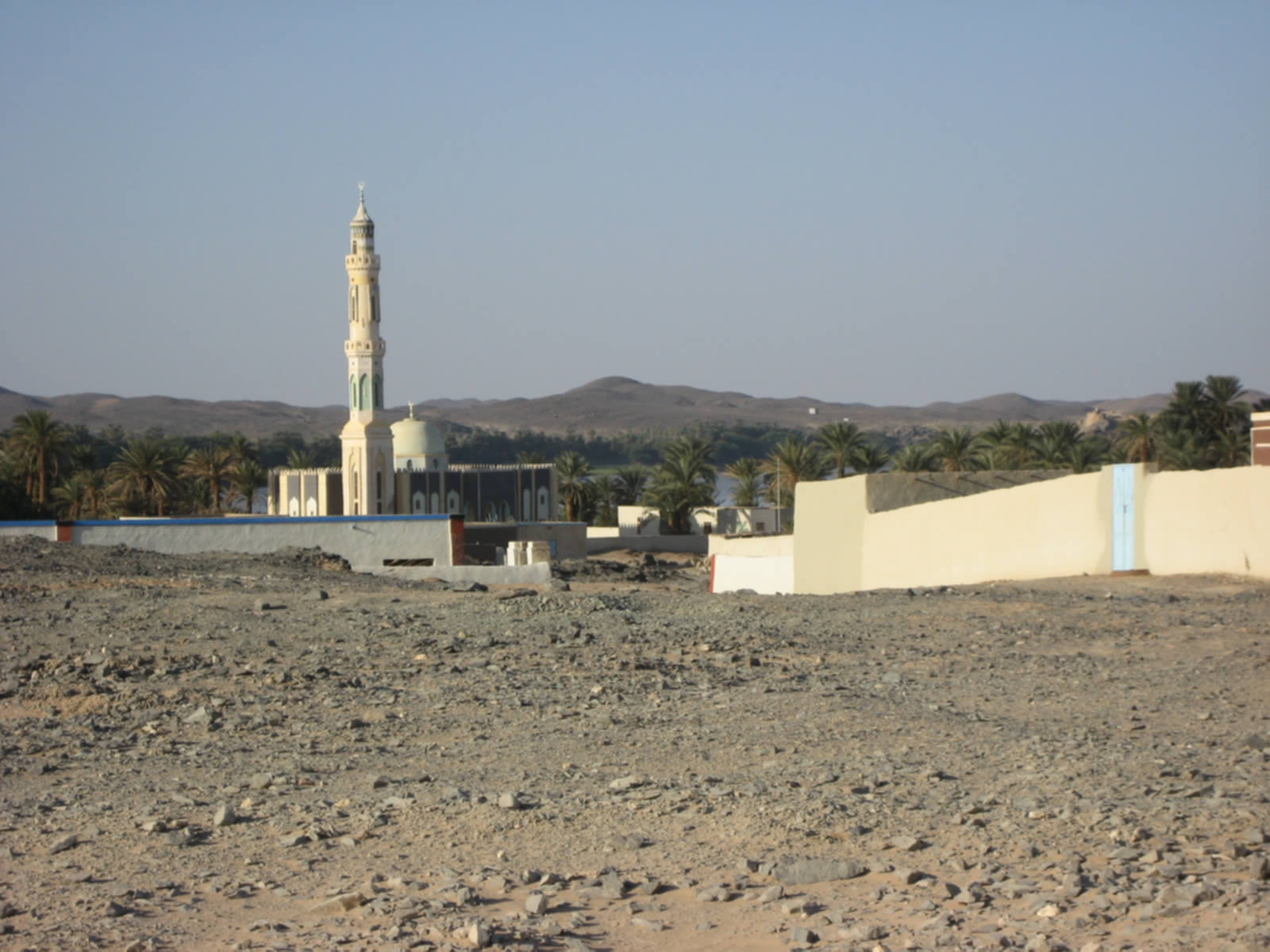 argest country of the African continent, is behind us. A country of proud people, bending under the worldwide negative image of their homeland. Time and time again we were reminded of their feelings, but in the various speeches by officials total denial of the situation in Darfur (all American propaganda), whereas we spoke to refugees in the villages. A country with a tradition of
argest country of the African continent, is behind us. A country of proud people, bending under the worldwide negative image of their homeland. Time and time again we were reminded of their feelings, but in the various speeches by officials total denial of the situation in Darfur (all American propaganda), whereas we spoke to refugees in the villages. A country with a tradition of
hospitality and friendliness toward travellers and strangers. Not once did I feel uncomfortable among the people. One thing I will not miss is the call to pray and especially the one at 4:30 a.m. I have the feeling that this country has given me more than I have been able to return.
 argest country of the African continent, is behind us. A country of proud people, bending under the worldwide negative image of their homeland. Time and time again we were reminded of their feelings, but in the various speeches by officials total denial of the situation in Darfur (all American propaganda), whereas we spoke to refugees in the villages. A country with a tradition of
argest country of the African continent, is behind us. A country of proud people, bending under the worldwide negative image of their homeland. Time and time again we were reminded of their feelings, but in the various speeches by officials total denial of the situation in Darfur (all American propaganda), whereas we spoke to refugees in the villages. A country with a tradition of hospitality and friendliness toward travellers and strangers. Not once did I feel uncomfortable among the people. One thing I will not miss is the call to pray and especially the one at 4:30 a.m. I have the feeling that this country has given me more than I have been able to return.


























































































